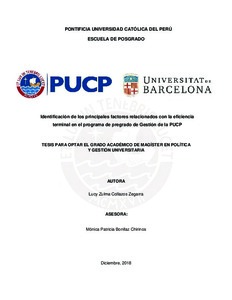| dc.contributor.advisor | Bonifaz Chirinos, Mónica Patricia | |
| dc.contributor.author | Collazos Zegarra, Lucy Zulma | es_ES |
| dc.date.accessioned | 2019-02-28T17:51:08Z | es_ES |
| dc.date.available | 2019-02-28T17:51:08Z | |
| dc.date.available | 2019-02-28T17:51:08Z | es_ES |
| dc.date.created | 2018 | es_ES |
| dc.date.issued | 2019-02-28 | es_ES |
| dc.identifier.uri | http://hdl.handle.net/20.500.12404/13580 | |
| dc.description.abstract | La eficiencia terminal es un indicador de calidad educativa que ha sido poco atendido
dentro de la Universidad, este indicador mide la proporción de alumnos que egresan
sobre los que ingresan de una misma cohorte.
En la Facultad de Gestión y Alta Dirección se detectó que este indicador es bajo, el cual
afecta directamente a la calidad de la carrera y en gran medida a los estudiantes. Por
este motivo surge la necesidad de identificar cuáles son los principales factores que
están relacionados con la eficiencia terminal en la carrera de Gestión.
Esta investigación parte de una clasificación de variables en dos grupos. El primer grupo
incluye variables asociadas al perfil del estudiante y el segundo incluye variables
institucionales. Para la recopilación de datos se ha recurrido a los registros
institucionales adicionalmente se realizó una encuesta de percepción a los egresados
de la carrera. Cada una de las variables seleccionadas ha sido analizada para identificar
si es que existe alguna relación con la eficiencia terminal.
A raíz del análisis se ha detectado que los principales factores asociados a la eficiencia
terminal son los institucionales, que incluyen variables curriculares que están
relacionadas al plan de estudios y al proceso de titulación de la Facultad. Por otro lado,
dentro del perfil del estudiante las variables académicas tales como promedio de notas
y Craest tienen una relación moderada con la eficiencia terminal.
Por último, tomando en cuenta los resultados se ha realizado una propuesta que incluye
acciones de mejora que podrán ser implementadas por la Facultad de Gestión. | es_ES |
| dc.description.abstract | The terminal efficiency is an indicator of educational quality that has been little attended
in the University, this indicator measures the proportion of students who graduate over
those who enter the same cohort.
In the school of Management and Senior Management it was detected that this indicator
is low, which directly affects the quality of the career and to a large extent the students.
For this reason, there is a need to identify which are the main factors that are related to
terminal efficiency in the career of Management.
This investigation starts from a classification of variables in two groups. The first group
includes variables associated with the student's profile and the second includes
institutional variables. In order to collect data, institutional records were used.
Additionally, a perception survey was conducted of the graduates of the career. Each of
the selected variables has been analyzed to identify if there is any relationship with the
terminal efficiency.
As a result of the analysis, it has been detected that the main factors associated with
terminal efficiency are the institutional ones, which include curricular variables that are
related to the curriculum and the degree process of the Faculty. On the other hand, within
the student's profile, academic variables such as grade point average and Craest have
a moderate relationship with terminal efficiency.
Finally, taking into account the results, a proposal has been made that includes
improvement actions that may be implemented by the school of management. | es_ES |
| dc.description.uri | Tesis | es_ES |
| dc.language.iso | spa | es_ES |
| dc.publisher | Pontificia Universidad Católica del Perú | es_ES |
| dc.rights | info:eu-repo/semantics/openAccess | es_ES |
| dc.rights.uri | http://creativecommons.org/licenses/by/2.5/pe/ | * |
| dc.subject | Pontificia Universidad Católica del Perú. Facultad de Gestión y Alta Dirección | es_ES |
| dc.subject | Calidad de la educación--Evaluación | es_ES |
| dc.subject | Educación superior--Perú--Lima | es_ES |
| dc.title | Identificación de los principales factores relacionados con la eficiencia terminal en el programa de pregrado de Gestión de la PUCP | es_ES |
| dc.type | info:eu-repo/semantics/masterThesis | es_ES |
| thesis.degree.name | Maestro en Política y Gestión Universitaria | es_ES |
| thesis.degree.level | Maestría | es_ES |
| thesis.degree.grantor | Pontificia Universidad Católica del Perú. Escuela de Posgrado | es_ES |
| thesis.degree.discipline | Política y Gestión Universitaria | es_ES |
| renati.advisor.dni | 07706739 | |
| renati.advisor.orcid | https://orcid.org/0000-0003-4718-2721 | es_ES |
| renati.discipline | 191847 | es_ES |
| renati.level | https://purl.org/pe-repo/renati/level#maestro | es_ES |
| renati.type | http://purl.org/pe-repo/renati/type#tesis | es_ES |
| dc.publisher.country | PE | es_ES |
| dc.subject.ocde | https://purl.org/pe-repo/ocde/ford#5.03.01 | es_ES |






